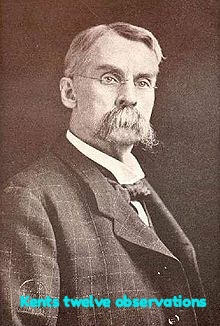1. FIRST OBSERVATION - Prolonged aggravation followed by final decline of the patient .
Prognosis - Very bad
Inference - The cas has taken an incurable direction and irreversible changes has taken place and the medicine given was too deep.
What to do? - Give medicine in not more than 30th potency.
2. SECOND OBSERVATION - Prolonged aggravation with final & slow improvement .
Prognosis- Good
Inference- The case was a borderline and was at the verge of becoming incurable. There was beginning of marked tissue changes.
What to do ?- Give remedy in more than 30th potency.
3. THIRD OBSERVATION- Quick , short and strong aggravation with rapid improvement of patient.
Prognosis- Very good
Inference- Remedy—correct,Reaction-vigorous, Improvement-marked,No structural changes
What to do ? - Not to disturb the action of the medicine
4. FOURTH OBSERVATION- No aggravation with recovery of the patient
Prognosis - Good in acute but doubt ful in chronic cases
Inference - In this case, the selection of remedy , dose , potency are suitable , No pathological changes present the disease is in functional level .
What to do? - Its best seen in acute cases . Recovery of patient is seen. Select deeper medicine in chronic diseases .
5. FIFTH OBSERVATION- Amelioration comes first and aggravation comes after
Prognosis - Unfavourable
Inference- Medicine prescribed acted superficially and has palliated the case. Or the patient is in incurable state.
What to do ?- Re case taking and prescribe a new medicine.
6. SIXTH OBSERVATION- Too short relief of the symptoms
Prognosis - Poor
Inference - In this case, when there is too short relief of symptoms , the case should be re examine and the obstacle to cure should be found out .
In this case the patient may have done something to interrupt action of the remedy.
If it seen in case of chronic ones , then its indicates that the pathology is set in and the prognosis would be bad .
What to do ? Repeat remedy more frequently in acute diseases.
7. SEVENTH OBSERVATION - Full time amelioration of symptom yet no special relief to patient.
Prognosis - Poor - patient can't be cured completely, he can be ameliorated to certain extent.
Inference - Its seen in latent conditions or latent existing organic conditions , the improvement is at certain degree .
Ex Patient with one kidney can only improve to a certain degree , the symptoms will be ameliorated from time to time with remedies but its up to certain degree beyond that is not possible .
What to do ? - Patient can only be palliated.
8. EIGHTH OBSERVATION - Some patients prove every medicine .
Inference - Idiosyncratic patient.
What to do? - Prescribe them low / moderate potencies.
9. NINTH OBSERVATION - Action of medicine upon prover.
10. TENTH OBSERVATION - New symptoms appears.
Prognosis - unfavourable
Inference - Medicine wrong (non homeopathicity to the condition)
What to do ? If new symtoms are not serious them it is wise to let then pass off.
But if they are serious then re case taking is advised. Use old and new symptoms to decide on medicine.
11. ELEVENTH OBSERVATION - When old symptoms reappear. (Herings law)
Prognosis- Very good
Inference -The patient is on road of recovery .
What to do ? - If old symptom stay then a repetition of dose is often necessary .
12. TWELTH OBSERVATION - Symptoms take wrong direction.
Prognosis - poor
Inference - Wrong medicine was given.
What to do ? - Antidote immediately.



.jpeg)
.jpeg)